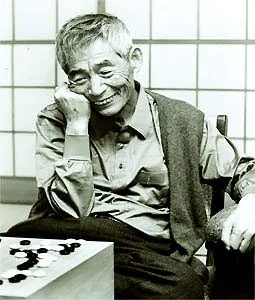Shuko Fujisawa: The Artistic Go Master
DISCLAIMER: This blog post contains affiliate links. If you click on a product link and make a purchase, I will receive a small commission at no extra cost to you. This helps support the blog and allows me to continue providing quality content. Thank you for your support
Fujisawa, Shuko (藤沢秀行)
Few players embodied the raw creativity of Go like Fujisawa Shuko, also known as Fujisawa Hideyuki. Though known by both names, he was often simply referred to as "Shuko" in the Go world.
Born in 1925 as Fujisawa Tamotsu, Fujisawa changed his given name to Hideyuki in 1943. While his name officially contained the characters for "Hideyuki(秀行)," the alternative reading "Shuko(秀行)" stuck as his nickname. The "Shu(秀)" character matched many historic Honinbo names.
Fujisawa embraced this moniker, frequently using Shuko in his book titles. But in his autobiography, he stated he still preferred his original name Hideyuki. Regardless, his creative brilliance made Shuko synonymous with artistic Go mastery.
Imagination on the Board
Shuko's genius began with imagination. Unbound by convention, he conceived groundbreaking fuseki and moves. This creativity fueled his rise to become Honinbo and Meijin champion. Even late in his career, Shuko's innovation continued as he claimed the Oza title in his 60s.
By combining ideas in unexpected ways, Shuko pioneered the Go theory and strategy. He imagined the game with a fresh perspective, forming visions others deemed controversial. But Shuko had the perseverance to prove his methods.
The Mark of a Pioneer
Throughout his five-decade career, Shuko creatively forged new territory. His flexible style and artistic flair showed that breaking the rules could lead to greatness.
Shuko's legacy lives on through the many top players he mentored, passing on this wisdom. Though at times unorthodox, Fujisawa Shuko used his immense creativity to permanently transform the game of Go. He revealed the vast horizons that imagination can unlock.
Cultivating Your Inner Artist
Shuko demonstrates that all Go players have creative potential within. By being open-minded, curious, and daring to be different, we can make innovative discoveries at the board. Don't just imitate - create. Bring your own imagination, passion, and style to the game. Wherever creativity takes you, the journey will be fulfilling.
The Legacy of Shuko
While known for his free-flowing creative play, Fujisawa Shuko amassed an impressive record of major titles during his long career.
Shuko dominated the prestigious Kisei tournament, winning a record six consecutive championships from 1977-1982. He also claimed victory in the Meijin twice and the Honinbo twice.
Overall, Shuko captured 20 major titles over his five-decade career. He was a runner-up for 20 other titles, demonstrating his consistency at the top.
Some highlights of Shuko's title record:
6-time Kisei champion (1977–1982)
2-time Meijin winner (1962, 1970)
5-time Oza winner (1967–1969, 1991-1992)
2-time Honinbo winner (1960, 1966)
2-time Asahi Pro Best Ten winner (1965, 1968)
Shuko's creative brilliance powered him to victories from the 1960s through the 1990s. His enduring title legacy is a testament to Shuko's lasting impact on the Go world. Even in championships he narrowly lost, Shuko proved the value of imaginative play.
Shuko’s Major Publications on Amazon
Dictionary of Basic Tesuji: Volume 1: Tesuji for Attacking:
Dictionary of Basic Tesuji, Volume 2: Tesuji for Defending:
Reducing Territorial Frameworks: Attacking and Defending Moyos:
Shuko: The Only Move - Vol. 2 Fighting Middlegame Collection:
The Best of Kido: The Ins and Outs of Life and Death:
Go on the Go Collection: Volume I:
Amazing Happenings in the Game of Go (Kido Classics Book 1):
Amazing Happenings in the Game of Go (Kido Classics Book 2):


